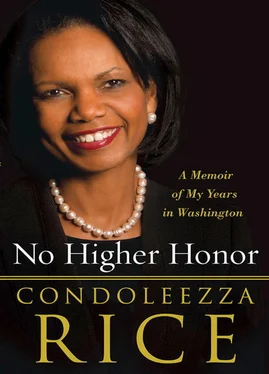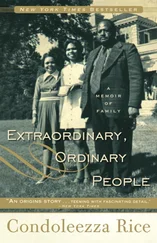For the most part we managed the tensions between us. But we did clash with increasing frequency as time went on. It’s always uncomfortable, particularly for the President, for a member of the President’s staff to challenge a Cabinet secretary. Still, on a few occasions, Don and I did tangle in front of others. After one such episode, the two of us were walking side by side through the Rose Garden portico. I turned to Don and asked, “What’s wrong between us?”
“I don’t know,” he said. “We always got along. You’re obviously bright and committed, but it just doesn’t work.”
Bright? That, I thought to myself, is part of the problem. Don had been more comfortable in the old days, when he was the senior statesman championing my career. A relationship between equals was much harder for him.
Colin, on the other hand, always seemed very comfortable with my role and our personal relationship. I’d first met him in 1987, when he was deputy national security advisor and I was on a one-year fellowship with the Joint Chiefs of Staff. He invited me to a pleasant lunch, and we conversed about my future. He and his wife, Alma, became my friends. Alma and I shared familial ties in Birmingham, Alabama. My father had worked for Alma’s uncle, who was the principal of the second largest black high school. Alma’s father, Mr. R. C. Johnson, was the principal of the largest, Parker High, and was a legend in our middle-class, segregated community.
Colin knew how hard the NSA job was, and he tried to be supportive. But he also, I believe, thought that I was not strong enough in my support of him and the State Department agenda. He asked me many times why I didn’t go to the President to “discipline” Defense for any number of sins of omission or commission, some imagined, some not. He probably didn’t realize how often I took State’s case to the President sympathetically.
But truthfully, I wondered why he did not take greater advantage of his extraordinary stature. Sometimes I would go to the President and suggest that it was time for him to sit down with Colin over dinner; the relationship between the two men was always better after they did. I often told the President before one of those sessions that Colin was very unhappy and would tell him so. He didn’t, and the President sometimes had difficulty gauging the extent of Colin’s dissatisfaction. I hate pop psychoanalysis, but I did sometimes wonder what held Colin back; perhaps the “soldier” felt constrained, and, of course, he had to be aware that he probably would have been President had he chosen to run. The relationship between George W. Bush and Colin Powell was thus respectful—genuinely so—but complicated.
In short, the President knew that Don and Colin did not get along, and decision making was difficult. My task was to work around the personal distrust between the two men, a task that became harder as the problems became more difficult. In the final analysis, Colin was probably right when he asked me one day, “Why doesn’t the President just square the circle? One of us needs to go.” I should have gone to the President and asked him exactly that. The President might have made a change, but where? Colin was essential to dealing with foreign governments, and the Pentagon was in the middle of a war under Don’s leadership. I thought it was better to try to make it work. Despite the challenges, I learned important lessons from those bureaucratic struggles that I would take with me to State a few years later.
In the end we kept going, with Don complaining to the Vice President that I was slanting decision making toward State and Colin complaining to me that Defense was in league with the Vice President’s office to undermine State’s positions. And, mirroring what was going on at the top, the relationship between those at lower ranks grew increasingly unworkable. Sometimes the lower levels at Foggy Bottom (where the State Department is located) would, inexplicably, leak to the press that State was being outmaneuvered by Defense. Leaks are debilitating, sowing distrust among the officials who have to work together and coloring the President’s options. People do it to show that they are in the know or to advance a position. But for the life of me, I could never understand why it was career-enhancing for State to tell the press that Colin was losing every bureaucratic battle. In fact, State was winning its share.
I’ve asked myself many times how I might have broken this cycle of distrust and dysfunction. Steve Hadley and I managed to make the creaky system work most of the time. We were able to do so in fighting the war in Afghanistan, helping to liberate Liberia, pushing a transformational agenda through NATO, sustaining peace in the Balkans, managing crises between India and Pakistan, launching the President’s compassion agenda, and restructuring our approach to the Palestinian-Israeli conflict. But in the taxing issue of Iraq, the stress on the NSC system brought it—and our personal relationships—nearly to the breaking point.

3
POLICY BEGINS
EVERY PRESIDENT COMES to office determined to set a new course in foreign policy. This tends to be the case even when there is no change in party. When George H. W. Bush entered the White House in 1989, Brent Scowcroft instructed the NSC staff to initiate a series of policy reviews. The purpose was to give time to get new people into place and, in the case of European and Soviet policy, to slow down what was widely seen as Ronald Reagan’s too-close embrace of Mikhail Gorbachev in 1988. The reviews, two of which I personally managed, seethed with distrust of the changes taking place in Eastern Europe and the Soviet Union. Yet the rapid collapse of communism got our attention in time to overcome our inherent caution. Fortunately, no one remembers that we wrote policy guidance questioning Gorbachev’s motives and setting up careful “tests” of Moscow’s intentions months before the collapse of Soviet power in Eastern Europe and the unification of Germany.
When there is a change of party on the heels of a hardfought campaign, the desire to seize the agenda is, of course, more pronounced. The Bush approach had been laid out in a series of speeches during the campaign, and we immediately set about executing the initiatives.
The most comprehensive of those speeches had been the governor’s appearance at the Ronald Reagan Presidential Library and Museum in November 1999. The venue was as important as the speech, since the event represented a kind of laying on of hands by the Reagan establishment, in particular Nancy Reagan. She couldn’t have been more gracious and remained so throughout the administration.
At the time, though, one subtext in the campaign was whether the presidency of George W. Bush would be, in effect, a second term for George H. W. Bush. This had important ramifications not only in domestic policy concerning taxes (Bush 41’s nonfulfillment of his “no new taxes” pledge still rankled many Republicans, who were hoping for better from Bush 43) but also in foreign policy, where George H. W. Bush was viewed with suspicion in conservative circles. Until the end, the policies of the two men would be compared and contrasted: realism versus idealism; diplomacy versus confrontation; compromise versus absolutism; prudence versus plunging. In fact, I regarded—and still regard—the hyperbolic comparisons, drawn in stark shades of black and white, as unfair. Yes, there were differences in style and temperament, with George W. Bush quicker to anger and less given to shades of gray. But to the degree that the differences were sharp (and they sometimes were), it was in large part because 1989 and 2001 were worlds apart. George H. W. Bush is and always should be remembered for his tactful personal diplomacy that ended the Cold War. The successful—though inconclusive—Persian Gulf War is also part of his impressive legacy.
Читать дальше













